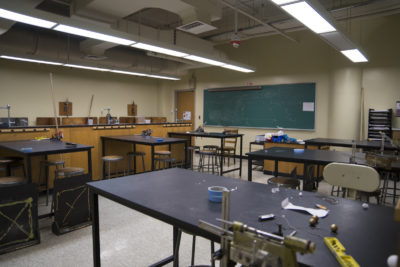
Boston University School of Medicine has received a two-year, $300,000 grant from the National Science Foundation for its BEST BET project, which aims to expose undergraduate students from underrepresented populations to careers in science, technology, engineering and mathematics, according to a press release from the school.
The BEST BET project, which stands for Broadening Experiences in Scientific Training – Beginning Enhancement Track, will seek to engage students in fields including biotechnology and pharmaceutical industries, science communication, science policy and technology transfer/patent law.
Maria Ober, BUSM spokesperson, said with this grant, the university will “lead the effort to extend the footprint of the BEST programs to [undergraduate] life science majors with a focus on those from underrepresented, socioeconomically disadvantaged and disabled groups.”
BU was one of 27 institutions to receive the grant and is the leader in promoting the BEST BET project, according to the press release.
Linda Hyman, associate provost for the Division of Graduate Medical Sciences, is the principal investigator for the project. Hyman said she brings the institutions together to “work toward introducing careers in biomedical sciences to undergraduates.”
Hyman added that this grant is important because it opens up other scientific paths to underrepresented students who enter college thinking of medical school as the only route to satisfy their scientific interests.
“The purpose of this grant is to enlighten people about all the different kinds of careers that are open to individuals who are interested in biology and medical research,” Hyman said.
Hyman also explained her focus is on making the field of biomedical research diverse and inclusive.
Several BU students studying fields in science, technology, engineering and mathematics said they were excited the university received a grant to expand career opportunities among underrepresented groups.
Jesse Mendoza, a junior studying chemistry in the College of Arts and Sciences, said he thinks that “any type of grant given to a heavily research-based school such as BU is great.”
Mendoza also said he hopes the grant money helps minority populations establish themselves in the sciences.
“I know it was hard for me, from the small town in California I come from, to get involved in science because I didn’t have the money to,” Mendoza said. “I hope the grant allows minority groups to really make a name for themselves in the scientific field, like [the Undergraduate Research Opportunities Program] did for me in the field of chemistry at BU.”
Jaime Rodriguez, a junior in CAS studying biochemistry and molecular biology, said he was glad the university is helping to expand opportunities for all students.
“I believe the STEM field will lead to great innovations that will help the world as a whole,” said Rodriguez. “I find it fitting that this organization is trying to get everyone involved in the STEM area, giving everyone an opportunity to contribute toward this common goal.”
Nicole Enos, a junior studying biomedical engineering in the College of Engineering, explained that the underrepresentation in the STEM fields begins before students come to college.
“People are already underrepresented coming to college, the problem doesn’t start in college,” said Enos. “Many students in poorer areas have less enriched STEM programs in their areas so they don’t have that passion developed the way other more privileged children do. [The grant] treats the symptoms and not the issue.”
However, Enos said she is hopeful the NSF grant will make the sciences a more inclusive field.
“Hopefully it’ll bring more underrepresented people in STEM more representation,” she said. “And it means more research money for the school, so maybe they’ll discover some more cool stuff, regardless of who does it.”


















































































































